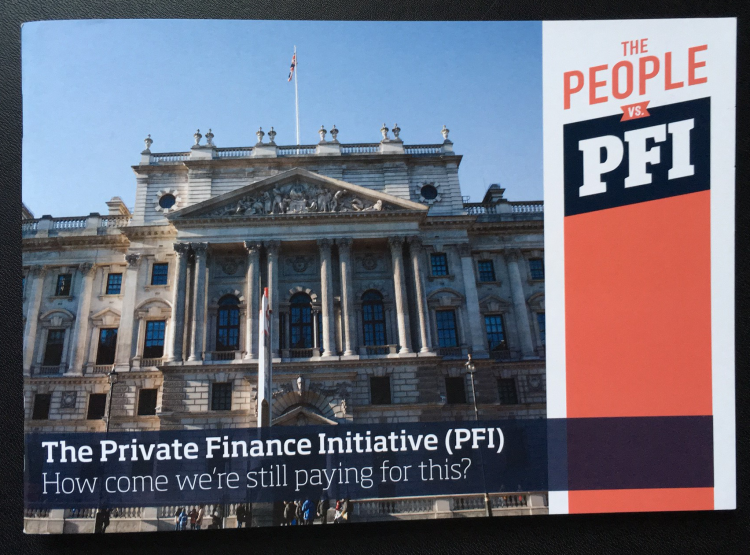A new exhibition makes the case against the Private Finance Initiatives

A new exhibition –How come we’re still paying for this? By the campaign group The People Vs. PFI lays out the case for the prosecution. The collapse of Carillion has cast an anti-halo over the whole process of outsourcing in general, but while PFI has been unpopular for years (a 2002 survey found the majority of the public supported a moratorium) dissatisfaction with PFI has picked up a political salience that it lacked in the past. To pick just one example, the collapsed wall at Oxgangs Primary School in Edinburgh, which would have been fatal were it not for very good luck, revealed a catalogue of cut-corners and shoddy workmanship that put children at risk at great expense to the public purse.
But near fatal negligence is not the only crime on PFI’s rap sheet. A report from the National Audit Office found that PFI had incurred billions of pounds of additional costs without providing any additional benefit. They also found very little substantive difference between PFI and its replacement PF2. Cash strapped local authorities, Care Commissioning Groups and schools are being forced to expend millions on services regardless of need, while unable to afford essential services and equipment. Liverpool council are still paying over £4m a year for a secondary school that now stands empty. Current PFI contracts have a capital value of £60bn, over the next two decades they will cost us £199bn.
An Audit Commission report from 2003 found that in a range of areas, including architectural design, user productivity and ownership costs, the quality of PFI schools was significantly worse than traditional non-PFI schools.
The NAO found “no meaningful differences” between build quality between PFI and non-PFI hospitals and no significant difference in maintenance costs, although a number of maintenance problems were identified in PFI hospitals.
Several interventions from Westminster have made it clear that the political legitimacy of these schemes has been severely dented. Noted left-wing radicals like Jeremy Hunt, Priti Patel and Boris Johnson have all raised concerns about the pernicious impact on the public realm.
But while Jeremy Hunt might fret about the impact of PFI on the UK health service, the Department of Health continue to push PFI internationally. Both the DoH and International Trade promoted schemes with UK firms as efficient" and "cost effective" via a vehicle called ‘UK Health’. While we may, finally be willing to disavow PFI at home, when it comes to the international scene, we don’t preach what we practice.
A new exhibition that is touring the country has crystallised this dissatisfaction. On Tuesday the People Vs. PFI brought their exhibition to Westminster, where they were hosted by John McDonnell, and joined by Sarah Jayne Clifton of Jubilee Debt Campaign and Dexter Whitfield from the European Services Strategy Unit.
The very fact that such an event could take place in parliament, with the participation of the Shadow Chancellor is an indication of how far the debate on PFI has shifted. For most of the 1990’s and the first decade of the new Millennium PFI had support from both main parties. The People Vs. PFI campaign is an attempt to capitalise on that change, and as such it deserves the support of everyone who cares about public services, regardless of their political affiliation.
Stay Updated
Want to hear about our latest news and blogs?
Sign up now to get it straight to your inbox
